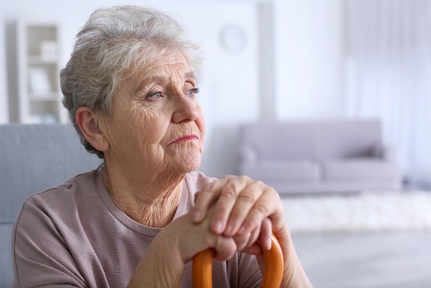Malnourished over 75s think they don't need to eat much because they're old
A growing malnutrition crisis amongst Britain's elderly population has been revealed by a poll which discovered too many people aged 75+ (27 per cent) think they should eat less now that they are older.

Half of people aged over 75s eat smaller meals and more than a third (34 per cent) regularly skip meals each week, according to a YouGov poll of 1,013 people aged 50+.
Professor Jane Murphy, Professor of Nutrition at Bournemouth University, who has led research on nutrition in older generations and people living with dementia, said: “It’s a myth to assume that losing weight and becoming frail are an inevitable or natural part of the ageing process.
“Malnutrition is largely preventable and treatable, and yet this growing problem for our ageing population is often overshadowed by the health concerns of obesity.
“Awareness training for care professionals and families will lead to better understanding, detection and earlier diagnosis.”
Some 12 per cent are losing weight as a result of getting older, according to the research, commissioned by home care provider Home Instead Senior Care.
Sadly, some 10 per cent of older people polled said they do not have as much money to spend on food and one in five (20 per cent) are struggling to cook.
Almost one in five don't eat a meal with anyone for three months or longer
Home Instead Senior Care holds the highest number of Care Quality Commission (CQC) outstanding ratings given to a home care provider - 34 in total.
With 9,000 care workers caring for over 13,000 clients, it was prompted to commission the online poll in June after its own research last year found over a quarter (26 per cent) of families seeking home care support for elderly relatives were most worried about what, how much and with who their relatives were eating.
The majority of people aged 75+ (56 per cent) in the YouGov poll said they only eat with someone else once a week or less and nearly one in five (19 per cent) go three months or longer without eating a meal with anyone.
In response, Home Instead has launched its ‘Stay Nourished’ campaign with help from academics at Bournemouth University’s Ageing and Dementia Research Centre.
The campaign is aimed at helping families and care workers understand the importance of nutrition for older people, how to spot malnutrition in the elderly and help dispel misconceptions around diet and appetite as we age.
Martin Jones, managing director of Home Instead, said: “Food and nutrition play such an important role in our wellbeing and health – particularly as we get older. Malnutrition is a serious issue, which is compounded by, and exacerbates, other serious health issues often experienced by older people.”
1.3m older people at risk of malnutrition costing NHS £19.6bn a year
One in 10 older people in Britain (1.3 million) are malnourished or at risk of malnutrition – with the problem costing the NHS an estimated £19.6bn a year, according to research by British Association for Parenteral and Enteral Nutrition (BAPEN) and NIHR Southampton Biomedical Research Centre at the University Hospital Southampton.
Staff at Home Instead will be offering free 'Stay Nourished' advice sessions across the country to families on nutrition for older people. Programme materials for the sessions have been designed in consultation with Bournemouth University's Professor Jane Murphy.
Mr Jones added: “Becoming malnourished is a significant threat to health as we age and the research shows this is a concern for families across the country. Food and nutrition isn’t just a personal responsibility. We can all help by recognising when someone is struggling to prepare meals themselves, or when they are losing interest in eating.
“By knowing what to look out for, and what nutrition requirements look like, we can help ensure our elderly relatives stay nourished and hydrated, keeping them healthy and out of hospital.”
Latest News
 29-Jul-24
Dementia Bus gives carehome.co.uk staff insight into life with dementia
29-Jul-24
Dementia Bus gives carehome.co.uk staff insight into life with dementia
 27-Jul-23
UK's top home care agencies in 2023 revealed
27-Jul-23
UK's top home care agencies in 2023 revealed
 30-Nov-22
A quarter of older people keep their falls secret from family
30-Nov-22
A quarter of older people keep their falls secret from family
 29-Nov-22
'Covid-19 has not gone away' say terminally ill
29-Nov-22
'Covid-19 has not gone away' say terminally ill
 28-Nov-22
IT consultant who received poor care opens 'compassionate' home care business
28-Nov-22
IT consultant who received poor care opens 'compassionate' home care business